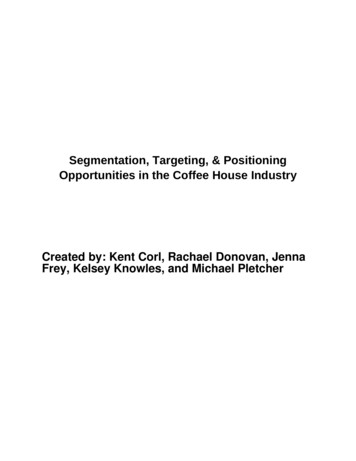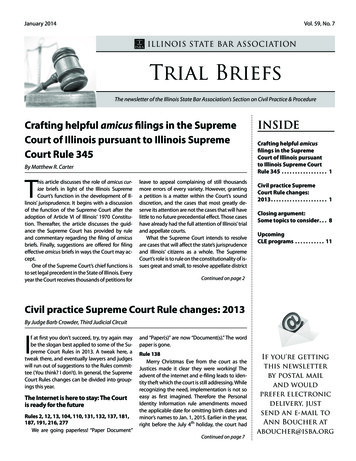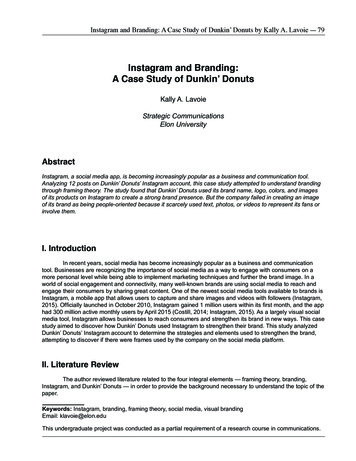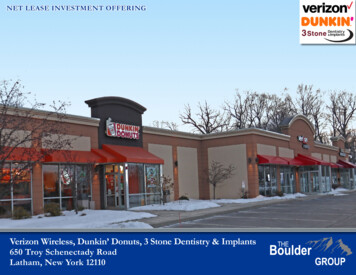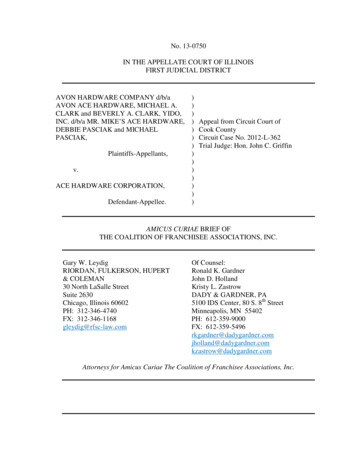
Transcription
No. 13-0750IN THE APPELLATE COURT OF ILLINOISFIRST JUDICIAL DISTRICTAVON HARDWARE COMPANY d/b/aAVON ACE HARDWARE, MICHAEL A.CLARK and BEVERLY A. CLARK, YIDO,INC. d/b/a MR. MIKE’S ACE HARDWARE,DEBBIE PASCIAK and MICHAELPASCIAK,Plaintiffs-Appellants,v.ACE HARDWARE l from Circuit Court ofCook CountyCircuit Case No. 2012-L-362Trial Judge: Hon. John C. GriffinAMICUS CURIAE BRIEF OFTHE COALITION OF FRANCHISEE ASSOCIATIONS, INC.Gary W. LeydigRIORDAN, FULKERSON, HUPERT& COLEMAN30 North LaSalle StreetSuite 2630Chicago, Illinois 60602PH: 312-346-4740FX: 312-346-1168gleydig@rfsc-law.comOf Counsel:Ronald K. GardnerJohn D. HollandKristy L. ZastrowDADY & GARDNER, PA5100 IDS Center, 80 S. 8th StreetMinneapolis, MN 55402PH: 612-359-9000FX: gardner.comkzastrow@dadygardner.comAttorneys for Amicus Curiae The Coalition of Franchisee Associations, Inc.
POINTS AND AUTHORITIESI.INTRODUCTION . 1II.SUMMARY OF ARGUMENT . 2III.FACTS . 4IV.ARGUMENT . 5A. The FTC Imposed Disclosure Requirements on Franchisors because ofMisleading Practices by Franchisors in Connection with the Sale andMarketing of Franchises. . 6Bus. Franchise Guide (CCH) ¶ 6301 . 6Bus. Franchise Guide (CCH) ¶ 6302 . 6Bus. Franchise Guide (CCH) ¶ 6305 . 6Bus. Franchise Guide (CCH) ¶ 6309 . 6Federal Trade Commission’s “Statement of Basis and Purpose Relating to DisclosureRequirements and Prohibitions Concerning Franchising and Business OpportunityVentures,” Bus. Franchise Guide (CCH), ¶ 6300 . 8SEC Rule 10b-5 . 816 C.F.R. Part 436. 8B. States Legislatures Have Followed the FTC’s Lead in EstablishingRegulatory Frameworks Governing Franchisors’ Sales of Franchises. . 9Indiana Franchise Act, Ind. Code § 23-2-2.5, et seq. 9C. During the Relevant Time Period, Franchisors were Obligated to MakeWritten Disclosures in Compliance with the UFOC Guidelines . 916 C.F.R. Part 436. 10Bus. Franchise Guide (CCH) ¶¶ 5751-5782 and 6227 . 10i
1. Any Franchisor Electing to Make “Earnings Claims” is Obligated to DoSo in Accordance with the “Instructions” Governing Disclosures capturedin Item 19. . 11Bus. Franchise Guide (CCH) ¶ 6307 . 12Commercial Prop. Invs. v. Quality Inns Int’l, Inc.,938 F.2d 870 (8th Cir. 1991) . 12Disclosure Requirements and Prohibitions Concerning Franchising and BusinessOpportunity Ventures; Promulgation of Final Interpretive Guidelines, 44 Fed. Reg.49,982 (August 24, 1979) . 12Bus. Franchise Guide (CCH) ¶ 5771, . 13, 14, 16, 17, 21a.Franchisors are Under No Obligation to Make an“Earnings Claim.” . 13b.Franchisors That Choose to Make an “Earnings Claim” Must do soOnly in Compliance with the UFOC Guidelines for Item 19. 13i. Any earnings claim must have a “reasonable basis.” . 14Bus. Franchise Guide (CCH) ¶ 6255 . 15, 18ii.Any earnings claim must include a description of its factual basis,along with four “basic disclosures” catalogued under Item 19,Instruction (B)(ii). . 15Bus. Franchise Guide (CCH) ¶ 6256 . 18iii. Ace should not be rewarded for its wide-ranging failures toprepare its earnings claims in compliance with the UFOCGuidelines for Item 19 . 18D. Plaintiffs Reasonably Relied on the Material Financial Information that AceProvided to Them, which Information Contained Key Misrepresentations andOmissions. 20Dave Thomas and Michael Seid, Franchising for Dummies 93 (2000) . 20Bus. Franchise Guide (CCH) ¶ 6,307 . 20ii
FTC v. Minuteman Press,53 F. Supp. 2d 248 (E.D.N.Y. 1998) . 20, 24E. The Circuit Court Erred in Determining that Plaintiffs’ Reliance on theFinancial Information in the UFOC was unreasonable. 21Motor City Bagels, L.L.C. v. Am. Bagel Co.,50 F. Supp. 2d 460 (D. Md. 1999 . 21Carousel’s Creamery, L.L.C. v. Marble Slab Creamery, Inc.,134 S.W.3d 385 (Tex. App. 2004) . 2116 C.F.R. § 436.9(h) . 22Bus. Franchise Guide (CCH) ¶ 6019 . 22Statement of Basis and Purpose; Bus. Franchise Guide (CCH) ¶ 6307 . 23F. The Circuit Court Erred in Determining that the Pro Formas Could Not Formthe Basis for a Fraud Claim Because They Were Future Projections. . 2419A Ill. Law and Practice, Fraud § 21 . 24Phil Dressler & Assocs., Inc. v. Old Oak Brook Inv. Corp.,192 Ill. App. 3d 577, 139 Ill. Dec. 629 (2d Dist. 1989) . 24Duhl v. Nash Realty Inc.,102 Ill. App. 3d 483, 57 Ill. Dec. 904 (1st Dist. 1981) . 24Louis v. Louis, 124 Ill. App. 2d 325 (1st Dist. 1970). 24Berg v. Xerxes-Southdale Office Bldg. Co., 290 N.W.2d 612 (Minn. 1980) . 24G. The Disclaimers Do Not Negate Reasonable Reliance Because They WereNot Specifically Tailored to Contradict the Claimed Misrepresentations. . 25Lucas v. Downtown Greenville Investors Ltd. P'ship,284 Ill. App. 3d 37, 49 (2d Dist. 1996) . 25H. The Circuit Court Erred In Misapplying the Bespeaks Caution Doctrine . 26Payne v. DeLuca, 433 F. Supp. 2d 547, 561 (W.D. Pa. 2006). . 27iii
I. As a Matter of Public Policy, Franchisors Should Not Be Able to ProvideFalse and Misleading Financial Performance Representations and then EscapeLiability Based on Cleverly Drafted Disclaimers. . 28815 ILCS 505/1 . 28Ind. Code. §23-2-2.5-1 . 28815 Ill. Comp. Stat. 505/11a . 28Johnston v. Anchor Org. for Health Maint.,250 Ill. App. 3d 393 (1st Dist. 1993) . 28Totz v. Cont’l Du Page Acura, 236 Ill. App. 3d 891 (2d Dist. 1992) . 28Ind. Code § 23-2-2.5-47 . 29Ind. Code § 23-2-2.7-1(5) . 29815 ILCS 505/10c. . 29Randall v. Lady of Am. Franchise Corp.,532 F. Supp. 2d 1071 (D. Minn. 2007) . 29-31Minn. Stat. § 80C.13 . 30Minn. Stat. § 80C.21 . 30Minn. Stat. § 80C.2 . 31Arnold v. Nat’l Aniline & Chemical Co.,20 F.2d 364 (2d Cir. 1927). 31Cousins Subs Sys., Inc. v. Better Subs Dev., Inc.,No. 09-C-0336, 2011 WL 4585541 (E.D. Wis. Sept. 30, 2011). 31D.T. Woodard, Inc. v. Mail Boxes Etc., Inc.,No. B228990, 2012 WL 90084 (Cal. Ct. App. Jan. 12, 2012). 31Besett v. Basnett, 389 So.2d 995 (Fla. 1980) . 31Long John Silver's Inc. v. Nickleson,Civil Action No. 3:11-CV-93-H, 2013 WL 557258 (W.D. Ky. Feb. 12, 2013) . 32iv
Hanley v. Doctors Express Franchising, LLC,Civil Action No. ELH-12-795, 2013 WL 690521 (D. Md. Feb. 25, 2013) . 32V.CONCLUSION . 33v
I.INTRODUCTIONAmicus Curiae The Coalition of Franchisee Associations, Inc. (“CFA”) submitsthis brief on behalf of Plaintiffs-Appellants and urges this Court to reverse the decisionissued by the Circuit Court because neither Defendant-Appellee’s franchise disclosuredocumentation nor its pro forma projections was prepared in keeping with black-letterfranchise disclosure requirements in force nationwide, including in Illinois and Indiana.The CFA is the only trade association dedicated to franchisees and franchiseesonly. Founded in 2007 and comprised of franchisee association leaders dedicated to thedevelopment and growth of their own franchisee organizations, the CFA brings togethersome of the most reputable independent franchisee associations with a mission “toleverage the collective strengths of franchisee associations for the benefit of thefranchisee community.” See the Affidavit of John D. Holland submitted herewith.Among the goals of the CFA is protecting the integrity of franchising andpreserving the value of franchised businesses. See Id. As a result, the CFA focuses itsefforts on government affairs at the state and federal levels, fair franchising, andfranchisee education and training. See Id. The CFA is particularly concerned withpreserving the integrity of the pre-sale, franchise disclosure process because pre-saledisclosure protocols are among the sole means that a prospective franchisee has to assessthe viability of the franchises being marketed by franchisors within the United States.See Id.The CFA’s Member Associations include: Asian American Hotel Owners AssociationBuffalo Wings National Franchisee AssociationDomino’s Franchisee AssociationDunkin’ Donuts Independent Franchise Owners1
Edible Arrangements Independent Franchisee Association, LLCIndependent Association of Massage Envy Regional DevelopersIndependent Coalition of Franchise Owners Independent Hardee’s FranchiseeAssociationIndependent Organization of Little Caesars FranchiseesLong John Silver’s Franchisee AssociationMeineke Dealers AssociationNational Coalition of Associations of 7-Eleven FranchiseesNational Franchisee Association, Inc.North American Association of SUBWAY FranchiseesPharmacy Franchisees and Owners Association, Inc.San Francisco - Monterey Bay 7-11 Franchise Owners AssociationService Station Franchise Association, Inc.Supercuts Franchisee AssociationThe CFA provides a voice for more than 30,000 franchise owners, operating over 70,000franchise locations staffed by over 1.3 million employees.II.SUMMARY OF ARGUMENTIn the United States, franchisors are obligated to prepare and present pre-saledisclosure documentation to prospective franchisees who are contemplating the purchaseof a franchise. When properly prepared, franchise disclosure documentation serves thepublic interest of protecting consumers and the remedial purpose of providingprospective purchasers with material and non-misleading information regarding thenature of the franchise opportunity. However, when prepared in a fashion other than thatcontemplated under applicable law, franchise disclosure documentation is inherentlymisleading and undermines the public’s interest in fair and honest business transactions.Appellee Ace Hardware Corporation (“Ace”) presented to Plaintiffs certainUniform Franchise Offering Circulars (“UFOCs”) as well as pro forma projections,regarding the alleged performance of a subset of Ace’s existing franchises.Plaintiffs-Appellants Avon Hardware Company, Michael Clark, Beverly Clark,Yido, Inc., Debbie Pasciak and Michael Pasciak (hereinafter collectively identified as the2
“Plaintiffs”) were entitled to full and fair disclosure regarding the franchise opportunitybeing marketed by Ace and to rely on the information prepared by Ace, as franchisor.Both the Federal Trade Commission and many state legislatures have concluded thatfranchisees who have been presented with misleading UFOCs and/or pro formaprojections are entitled to relief.Amicus Curiae CFA submits that neither Ace’s UFOCs nor Ace’s pro formaprojections were prepared in conformance with applicable UFOC Guidelines. As aresult, Plaintiffs’ claims, all relating to the misleading nature of the UFOCs and proformas, should have survived a motion to dismiss (as a matter of law) by the franchisor.As more fully detailed below, other courts which have passed on this issue haveconcluded that whether a prospective franchisee has “reasonably relied on” a pre-saledisclosure is a question of fact.On a more fundamental level, however, the ruling by the Circuit Courtundermines the disclosure frameworks adopted by both the federal and state regulators.Franchise disclosure frameworks were intended to provide prospective franchisees withfull and fair disclosure – without material omission. Ace’s UFOCs and pro formas didnot include a host of the substantive disclosure information which Ace was required toinclude in all such documents.Granted, both Ace’s UFOCs and pro forma projections included a “conspicuousadmonition” (i.e., a “disclaimer”) that Plaintiffs’ franchises may not duplicate thefinancial performance (allegedly) enjoyed by that subset of existing Ace franchiseesdocumented in the UFOC. However, the inclusion of such a “conspicuous admonition”is just one required element to be included in any UFOC and/or pro forma earnings claim3
crafted by a franchisor. To rule that a franchisor may, by inclusion of this disclaimeralone, refute as a matter of law any argument by a franchisee that he or she has materiallyrelied on the franchisor’s pre-sale disclosures, is to undermine the entire franchisedisclosure framework. This is particularly the case, as here, where the franchisor hasotherwise failed to comply with its disclosure obligations under the UFOC Guidelines.The consequences of Ace’s failure to include required disclosure informationconsistent with the UFOC Guidelines in its UFOCs and pro formas should fall on Ace, asopposed to Plaintiffs. Had Ace complied with its disclosure obligations, Plaintiffs likelywould have been dissuaded from purchasing their respective franchises.Ace should not be rewarded for having crafted earnings claims which fallwoefully short of the black-letter UFOC Guideline requirements.Reversal of the Circuit Court ruling would serve the remedial purpose of ensuringthat prospective franchisees receive full and fair disclosure, without material omission,consistent with applicable franchise disclosure requirements. By contrast, affirmance ofthe Circuit Court’s decision would serve only to embolden franchisors in their efforts tosidestep their disclosure obligations.III.FACTSAce crafted and presented to Plaintiffs certain UFOC franchise disclosuredocumentation (see Plaintiffs’ Appendix at A. 70-225 and 298-425), as well as pro formaprojections (see A. 45-68, 227-250, 252-275, and 427-446), regarding the franchisesbeing purchased by Plaintiffs.As more fully explained below, neither the UFOCs nor the pro formas crafted byAce were prepared according to the substantive requirements of the UFOC Guidelines.4
IV.ARGUMENTIn the United States, the sale of franchises is regulated in much the same fashionas the sale of securities. Franchisors are prohibited from making unfounded projectionsof financial performance to prospective franchisees by disclosure requirements intendedto provide prospective franchisees with all of the material information needed to make aninformed purchase decision.The record below reflects that Ace failed to prepare its franchise disclosuredocuments and pro formas according to the black-letter requirements of the UFOCGuidelines governing a franchisor’s presentation of financial data to prospectivefranchisees. As a result, Plaintiffs were deprived of that very information which mighthave dissuaded Plaintiffs from making a franchise purchase from Ace.Nonetheless, in proceedings before the Circuit Court, Ace successfully arguedthat Ace’s use of certain disclaimers should shield it from liability for having mademisleading “earnings claims” regarding the potential performance of Plaintiffs’franchised locations.Other courts that have considered these issues have concluded that franchisorscannot use improperly-formatted disclaimers to shield Ace from claims that its UFOCdisclosures and/or pro forma projections were misleading.The decision of the Circuit Court, dismissing Plaintiffs’ statutory and commonlaw claims as a matter of law, should be reversed. Plaintiffs were entitled to rely on theaccuracy of the pre-sale UFOC disclosures and pro formas crafted by Ace.5
A. The FTC Imposed Disclosure Requirements on Franchisors because ofMisleading Practices by Franchisors in Connection with the Sale andMarketing of Franchises.The sale of franchises is regulated on both the federal and state level.By way of background, in the 1950s and 1960s modern franchising took off as amethod of doing business, but sales of franchises were unregulated and subject towidespread abuse. See Bus. Franchise Guide (CCH) ¶ 6302. Thousands of people losttheir substantial franchise investments as a result of having been “misled as to the truerisks involved in the franchise investment by the franchisor’s failure to disclose materialfacts” concerning franchise offerings. See Id. at ¶¶ 6305, 6309. State and federalregulators began to study the situation in the late 1960s and concluded that the sale offranchises was similar to the unregulated sale of securities in the 1920s.Over the course of the 1970s, the Federal Trade Commission (“FTC”) undertookto study misleading practices by franchisors in connection with franchisors’ sale offranchises.See Bus. Franchise Guide (CCH) ¶ 6301.As reflected in the FTC’sStatement of Basis and Purpose Relating to Disclosure Requirements and ProhibitionsConcerning Franchising and Business Opportunity Ventures, the FTC made thefollowing material findings: “[M]isrepresentations and failure to disclose material facts are widespreadin franchising.” Bus. Franchise Guide (CCH) ¶ 6305. “On the basis of the record in this proceeding, the Commission concludesthat franchises have been marketed through (A) misrepresentation ofmaterial facts relevant to the nature and value of the franchise; (B)unsubstantiated claims regarding the potential sales, income, gross or netprofit of franchises; (C) unfair refusal by franchisors to honor refundprovisions and (D) failure to disclose material facts about the franchiseoffering.” Id.6
Many franchisors had made a practice of making “get rich quick” claimsin advertisements and other promotional materials, and “such ‘get richquick’ claims frequently either are unsubstantiated by the franchisor, orthey misrepresent material facts with regard to the ‘potential earnings’ of aparticular franchise business.” Id. at ¶ 6304. “[T]he record also discloses that many franchisors have highlighted theatypical success of a few franchisees without disclosing the nonrepresentative nature of these claims. Such representations are an unfairand deceptive trade practice.” Id. at ¶ 6307. That said, “For most prospective franchisees there is quite simply nosource other than the franchisor for much of the information necessary tomake an informed investment decision.” Id. at ¶ 6304. “The record establishes that prospective franchisees are at aninformational disadvantage with respect to the franchisor in evaluating thefranchise offering because of the setting in which franchises are sold.Because of this informational imbalance prospective franchisees do nothave information about material aspects of the franchise and frequently arenot even aware that they lack such information.Without suchinformation, however, prospective franchisees cannot evaluate the value ofthe franchise offering. The record establishes that franchisors takeadvantage of the informational imbalance to sell franchises withoutdisclosure of material facts.” Id. at ¶ 6309. “Without such information, prospective franchisees lack materialinformation concerning the prices, the risks, the potential profitability, andeven the nature and contents of the franchise offering.” Id. “[T]he item being offered – the franchise opportunity – is complex, andthe information necessary to test the accuracy of representations liesalmost solely within the possession of the franchisor. Indeed, even ifavailable, the search costs in obtaining such information would beprohibitive. Accordingly, prospective franchisees, of necessity, have torely on the accuracy of the representation of the franchisor as to theprofitability of the franchise.” Id. at ¶ 6307 (emphasis added). “The failure to disclose material facts concerning the franchise offering,where the prospective franchisee is at an informational disadvantage,violates public policy encouraging informed consumer purchasingdecisions.” Id. at ¶ 6309. “Disclosure requirements are effective means of curbing the ‘half-truth’and the failure to disclose used in marketing franchises because theyprovide prospective franchisees with at least the minimal information7
needed to make an informed decision whether to enter the franchiserelationship. By specifying the type of information which should beprovided, the rule prevents franchisors from selectively disclosing only theinformation which is favorable to them.” Id. at ¶ 6312. Going forward, “If franchisors choose to make representations concerningprofits, income or sales to prospective franchisees or in the media,”franchisors should be required to make “certain disclosures which areintended to give the prospective franchisee information which will enablehim or her to evaluate the merits of the franchisor’s claim.” Id.See the Federal Trade Commission’s “Statement of Basis and Purpose Relating toDisclosure Requirements and Prohibitions Concerning Franchising and BusinessOpportunity Ventures,” Bus. Franchise Guide (CCH) ¶ 6300, et seq.As a result, by the late 1970s, the sale of franchises came to be regulated in muchthe same fashion as the sale of securities under SEC Rule 10b-5.1 In 1979, the FTCadopted a trade regulation rule governing the sale of franchises that is roughly modeledon the SEC Act.See 16 C.F.R. Part 436 (the “FTC Franchise Rule”).The FTCFranchise Rule requires a franchisor to provide a prospective franchisee with certaindisclosures, contained in a written offering circular (not unlike a prospectus), prior to thepurchase of the franchise.1Rule 10b-5 of the Securities and Exchange Commission (codified at 17 C.F.R.240.10b-5) is one of the most important rules targeting securities fraud by the SEC,pursuant to its authority granted under section 10(b) of the Securities Exchange Act of1934. The rule prohibits any act or omission resulting in fraud or deceit in connectionwith the purchase or sale of any security. Rule 10b-5 provides that it shall be unlawfulfor any person, in connection with the purchase or sale of any security, “(a) To employany device, scheme, or artifice to defraud, (b) To make any untrue statement of a materialfact or to omit to state a material fact necessary in order to make the statements made, inthe light of the circumstances under which they were made, not misleading, or (c) Toengage in any act, practice, or course of business which operates or would operate as afraud or deceit upon any person.”8
B. States Legislatures Have Followed the FTC’s Lead in EstablishingRegulatory Frameworks Governing Franchisors’ Sales of Franchises.Certain states, including Indiana and Illinois, have parallel legislation and providefranchisees with the right to civil remedies if a franchisor, or its principals, fail to makerequired disclosures, or make misleading statements or omissions in connection with afranchise sale.2 See, e.g., the Indiana Franchise Act, Ind. Code § 23-2-2.5, et seq. TheIndiana Franchise Act is expressly modeled on the anti-fraud rules which govern the saleof securities. See Ind. Code § 23-2-2.5-27.3C. During the Relevant Time Period, Franchisors were Obligated to MakeWritten Disclosures in Compliance with the UFOC Guidelines.Through July 1, 2008, the FTC permitted franchisors to make the requireddisclosures through a document called the Uniform Franchise Offering Circular or2Because the franchise sales involved in this case took place in Indiana and Illinois,Plaintiffs are entitled to the protections of the statutes governing the sale of franchises toresidents of those two states.3The anti-fraud provision of the Indiana Franchise Act mirrors SEC Rule 10b-5, andprovides that: “It is unlawful for any person in connection with the offer, sale or purchaseof any franchise, or in any filing made with the commissioner, directly or indirectly: (1)to employ any device, scheme or artifice to defraud; (2) to make any untrue statements ofa material fact or to omit to state a material fact necessary in order to make the statementsmade, in the light of circumstances under which they are made, not misleading; or (3) toengage in any act which operates or would operate as a fraud or deceit upon any person.”9
“UFOC.”4 See 16 C.F.R. Part 436. The Midwest Securities Commissioners Associationadopted the so-called “UFOC Guidelines” in 1974.5At all times relevant hereto, the franchisor’s disclosure obligations to prospectivefranchisees under federal and state law could be satisfied by providing the prospectivefranchisee with an offering circular known as the UFOC – but only so long as thefranchisor complied with the disclosure obligations contained in the “UFOC Guidelines,”a standard set of disclosure protocols accepted by the FTC and state regulatory authoritiesfor purposes of franchise disclosure. See Bus. Franchise Guide (CCH) ¶¶ 5751-5782 and6227.6The UFOC Guidelines require a franchisor to make disclosure with respect to 23different “Items” of information, including the nature of the franchise; the principals whoown and run it; the costs of obtaining or operating the franchise; the existence oflitigation in which the franchisor has been involved; the material terms of the contract;the existence of other franchisees and their locations; and, if the franchisor chooses to4On January 22, 2007, the FTC amended its requirements related to disclosure. TheAmended Rule became effective on July 1, 2007, however, permission to use the FTCFranchise Rule and UFOC Guidelines formats continued through June 30, 2008. Therevised disclosure document, formerly known as the UFOC, is now referred to as theFranchise Disclosure Document (“FDD”). At the time of the disclosures required herein,the FTC Franchise Rule controlled, and the disclosure document required was the UFOC.5The North American Securities Administrators Association now administers the UFOCGuidelines.6The FTC “determined that, in the aggregate, the disclosures required by the UFOCformat provide protection to prospective franchisees which is equal to or greater than thatprovided by the [FTC Franchise] rule. As a result, and in an effort to minimizecompliance burdens, the Commission will permit the UFOC to be used in lieu of thedisclosure requirements” of the FTC Franchise Rule, however, “[e]ither t
Supercuts Franchisee Association The CFA provides a voice for more than 30,000 franchise owners, operating over 70,000 franchise locations staffed by over 1.3 million employees. II. SUMMARY OF ARGUMENT In the United States, franchisors are obligated to prepare and present pre-sale disclosure documentation to prospective franchisees who are .
